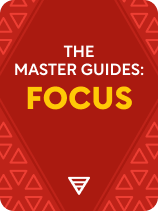

This article is an excerpt from the Shortform book guide to "The Master Guides: Focus" by Shortform. Shortform has the world's best summaries and analyses of books you should be reading.
Like this article? Sign up for a free trial here.
What does it mean to be focused? How do experts define focus? Why do we get distracted?
For some time now, psychologists, productivity experts, and tech industry gurus have sought to define the true meaning of focus and why we get distracted. In their efforts to discover how we can learn to stay on task, they’ve uncovered fascinating insights about what it means to be truly focused.
Read on to learn how they define focus and why we lose our concentration.
What Does It Mean to Be Focused?
Do you often feel that there isn’t enough time to finish all the projects you’d like to get done? Does it seem that when you try to concentrate on a task, your attention gets pulled in a thousand directions? Do you often feel like there are so many things on your to-do list that you never have any energy left for the things that matter to you most? Rather than blame the outside world for chipping away at your energy and time, it may be more productive and fulfilling to improve your ability to focus. But, what does it mean to be focused?
Many authors have tackled this subject to learn the true meaning of focus, from psychologists to productivity experts, business consultants, and tech industry gurus. Their consensus is that the ability to focus—to concentrate your attention on an individual task for a sustained period of time—is key to personal success and fulfillment, not just in your career but also in your personal life. They also agree that it doesn’t come naturally. Focus is a skill you have to learn through practice, deliberate repetition, and strategies to minimize the constant distractions of the modern world.
The Definition of Focus
To understand what it means to be focused, let’s take a look at how experts in the field of productivity define focus. In general, psychologists and productivity experts agree that “focus” is the ability to direct your attention to a single task and maintain it without distraction. In this article, we’ll look at different authors’ approaches to thinking about focus and why we get distracted.
What Do the Experts Say?
Concept #1: Focus is selective attention. One way we can understand what it means to be focused is by learning about open vs. selective attention. In his book Focus, psychologist Daniel Goleman highlights two mental states, open awareness and selective attention. Open awareness is a state of fluid, passive attention where you’re not focusing on one specific task. Selective attention is a type of effortful focus you use to filter through the flood of sensory stimuli and narrow your attention to what is relevant. As the name suggests, selective attention helps your brain select what is relevant and choose where you direct your attention. Later in this guide, we’ll discuss ways to improve your selective attention.
Concept #2: Focus is deep work. Computer science professor Cal Newport discusses focus in Deep Work, which he defines as focused, uninterrupted, undistracted work on a task that pushes your cognitive abilities to their limit. Newport explains that skills you need to succeed in the modern economy—like complex problem-solving, data analysis, and computer programming—require deep work to learn and execute. Your ability to do deep work will determine how much you thrive in the information economy, and in this guide we’ll explore several ways to set the stage for doing deep work in your daily life.
Concept #3: Focus is singular. In Eat That Frog!, business consultant Brian Tracy argues that there’s no such thing as multitasking—you can only focus on one thing at a time. What seems like multitasking is actually “task shifting,” or switching your attention between different things. After being interrupted, it takes 17 minutes to totally refocus on a task and continue. Starting and stopping repeatedly can increase the time needed to complete a task by 500%. In contrast, when you work without interruption, you can cut the time required to finish by half.
| The State of Flow Being focused can also mean achieving a state of flow. A heightened state of attention and complete focus, commonly referred to as “flow,” was first identified by psychologist Mihali Csikszentmihalyi. When you’re in flow, he discovered, you become engrossed in an activity, lose track of time, and lose yourself in the process, not pursuing any rewards at the end. Csikszentmihalyi’s research determined several features of flow: 1) To get into flow, you need to devote yourself to only one task. 2) The task must be intrinsically motivating. 3) The task must be just right—not too easy and not too hard. If it’s too easy, your brain won’t devote all its power to the task. If it’s too hard, you’ll become discouraged, which will prevent you from reaching a flow state. |
Why Do We Get Distracted?
Now that we understand how experts define what it means to be focused, let’s turn our attention to what causes us to lose our focus. The enemy of focusing your attention is distraction. Daniel Goleman outlines two main types of distractions: emotional, in which feelings take center stage and interrupt our attention, and sensory, in which a physical sensation such as pain or a loud noise commands our attention. Modern technology, especially our personal devices, is a relentless source of sensory distraction and can lead to addictive relationships with digital media. Whether the distraction is emotional or sensory, avoiding distraction and maintaining your focus requires a deliberate, conscious act of will.
Whereas experts generally agree on what it means to be focused and the nature of our ability to do so, there’s debate about what causes us to become distracted:
Theory #1: In Stolen Focus, Johann Hari makes the case that in the digital age, we’re being distracted on purpose. Tech companies carefully engineer their products to keep your attention for as long as possible, because the longer your eyeballs are glued to the screen—where advertisements are placed strategically among your friend’s cat videos—the higher the companies’ revenues. If your goal is to focus on your screen, tech is your friend; if your goal is to focus on anything else, tech is your enemy.
Theory #2: In Indistractable, Nir Eyal provides a different take on distraction—he argues that distressing internal emotional and sensory experiences are the reason why you become distracted. External distractions, such as digital technology, are essentially avenues we use to escape internal physical and emotional discomfort. Without internal triggers, your attention wouldn’t be driven to escape into social media or binge-watching television.

———End of Preview———
Like what you just read? Read the rest of the world's best book summary and analysis of Shortform's "The Master Guides: Focus" at Shortform.
Here's what you'll find in our full The Master Guides: Focus summary:
- A compilation of the best strategies from experts on improving focus
- How improved focus can improve your career and personal life
- How to create a distraction-free working environment






